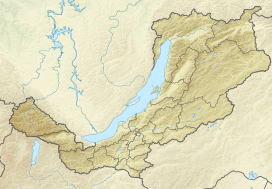Khamar-Daban
| Khamar-Daban | |
|---|---|
| Template:Lang-ru / Template:Lang-bua | |
 Landscape of the range | |
| Highest point | |
| Peak | Utulinskaya Podkova |
| Elevation | 2,396 m (7,861 ft) |
| Dimensions | |
| Length | 420 km (260 mi) E/W |
| Width | 65 km (40 mi) N/S |
| Geography | |
Location in the Buryatia, Far Eastern Federal District, Russia | |
| Country | Russia |
| Federal subject | Buryatia and Irkutsk Oblast |
| Range coordinates | 51°25′N 104°30′E / 51.417°N 104.500°E |
| Parent range | South Siberian System |
| Borders on | Eastern Sayan |
| Geology | |
| Rock type(s) | Slate, gneiss, basalt, limestone and granite intrusions |
| Climbing | |
| Easiest route | From Gusinoozyorsk |
Hamar-Daban (Template:Lang-ru; Template:Lang-bua, from hамар - "nut", and дабаан, "pass" or "ridge"), is a mountain range in Southern Siberia, Russia.
Geography
The range is located in Buryatia, with a small section in Irkutsk Oblast. It rises near the Baikal Mountains not far from Lake Baikal. It forms a geographic prolongation of the Sayan Mountains.[1] The highest peak is Utulinskaya Podkova at 2,396 m (7,861 ft). The southern end of the range is part of the Selenga Highlands.[2] The climate of the northern part of Hamar-Daban is affected by Lake Baikal, being temperate and humid, with precipitation up to 1,300 mm per year. The average January temperature is -16-18 °C.[3]

In popular culture
The song of the same name by Yuri Vizbor, written in 1962, is dedicated to the Hamar-Daban ridge.
Hamar-Daban pass incident
Six members of a seven person hiking group led by Lyudmila Korovina died in mysterious circumstances in 1993.[4] Valentina Utochenko was the only survivor.[5] Later autopsies found signs of hypothermia and protein deficiency in the deceased members of the hiking group.[6]
See also
References
- ^ Kozhov, M. (2013-11-11). Lake Baikal and Its Life. Springer Science & Business Media. p. 7. ISBN 9789401573887.
- ^ Natalʹi︠a︡ Vasilʹevna Fadeeva, Селенгинское среднегорье: природные условия и районирование (Selenga Highlands: Natural Conditions and Zoning) Buryat Book Publishing House, 1963 - Physical geography - 169 pages, (in Russian)
- ^ Sinyukovich VN; Chumakova EV (2009). "Современные особенности гидрометеорологического режима южного побережья оз. Байкал" [Modern features of the hydrometeorological regime of the southern coast of Lake Baikal] (PDF). Bulletin of Irkutsk State University (in Russian). 2 (2): 117–133. Archived from the original (PDF) on 2 October 2013.
- ^ Buryatia Incident: Russia's other Dyatlov Pass. 20 November 2019. Retrieved 14 January 2021.
- ^ Natalia Varsegova (24 July 2018). "Что произошло на бурятском "перевале Дятлова"" [What happened at the Buryat "Dyatlov pass"]. Komsomolskaya Pravda (in Russian). Retrieved 14 January 2021.
- ^ Oleg Yegorov (25 February 2019). "Beyond the Dyatlov mystery: 2 other creepy tragedies in the Russian mountains". Beyond Russia. Retrieved 14 January 2021.
External links
 Media related to Khamar-Daban at Wikimedia Commons
Media related to Khamar-Daban at Wikimedia Commons


